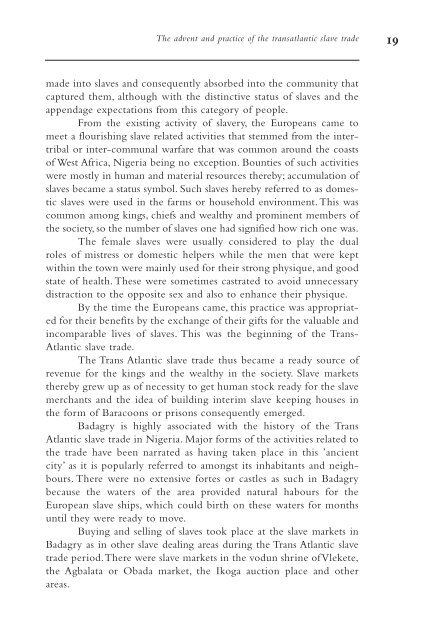Oral tradition relating to slavery and slave trade in Nigeria, Ghana ...
Oral tradition relating to slavery and slave trade in Nigeria, Ghana ...
Oral tradition relating to slavery and slave trade in Nigeria, Ghana ...
Create successful ePaper yourself
Turn your PDF publications into a flip-book with our unique Google optimized e-Paper software.
The advent <strong>and</strong> practice of the transatlantic <strong>slave</strong> <strong>trade</strong> 19<br />
made <strong>in</strong><strong>to</strong> <strong>slave</strong>s <strong>and</strong> consequently absorbed <strong>in</strong><strong>to</strong> the community that<br />
captured them, although with the dist<strong>in</strong>ctive status of <strong>slave</strong>s <strong>and</strong> the<br />
appendage expectations from this category of people.<br />
From the exist<strong>in</strong>g activity of <strong><strong>slave</strong>ry</strong>, the Europeans came <strong>to</strong><br />
meet a flourish<strong>in</strong>g <strong>slave</strong> related activities that stemmed from the <strong>in</strong>tertribal<br />
or <strong>in</strong>ter-communal warfare that was common around the coasts<br />
of West Africa, <strong>Nigeria</strong> be<strong>in</strong>g no exception. Bounties of such activities<br />
were mostly <strong>in</strong> human <strong>and</strong> material resources thereby; accumulation of<br />
<strong>slave</strong>s became a status symbol. Such <strong>slave</strong>s hereby referred <strong>to</strong> as domestic<br />
<strong>slave</strong>s were used <strong>in</strong> the farms or household environment. This was<br />
common among k<strong>in</strong>gs, chiefs <strong>and</strong> wealthy <strong>and</strong> prom<strong>in</strong>ent members of<br />
the society, so the number of <strong>slave</strong>s one had signified how rich one was.<br />
The female <strong>slave</strong>s were usually considered <strong>to</strong> play the dual<br />
roles of mistress or domestic helpers while the men that were kept<br />
with<strong>in</strong> the <strong>to</strong>wn were ma<strong>in</strong>ly used for their strong physique, <strong>and</strong> good<br />
state of health. These were sometimes castrated <strong>to</strong> avoid unnecessary<br />
distraction <strong>to</strong> the opposite sex <strong>and</strong> also <strong>to</strong> enhance their physique.<br />
By the time the Europeans came, this practice was appropriated<br />
for their benefits by the exchange of their gifts for the valuable <strong>and</strong><br />
<strong>in</strong>comparable lives of <strong>slave</strong>s. This was the beg<strong>in</strong>n<strong>in</strong>g of the Trans-<br />
Atlantic <strong>slave</strong> <strong>trade</strong>.<br />
The Trans Atlantic <strong>slave</strong> <strong>trade</strong> thus became a ready source of<br />
revenue for the k<strong>in</strong>gs <strong>and</strong> the wealthy <strong>in</strong> the society. Slave markets<br />
thereby grew up as of necessity <strong>to</strong> get human s<strong>to</strong>ck ready for the <strong>slave</strong><br />
merchants <strong>and</strong> the idea of build<strong>in</strong>g <strong>in</strong>terim <strong>slave</strong> keep<strong>in</strong>g houses <strong>in</strong><br />
the form of Baracoons or prisons consequently emerged.<br />
Badagry is highly associated with the his<strong>to</strong>ry of the Trans<br />
Atlantic <strong>slave</strong> <strong>trade</strong> <strong>in</strong> <strong>Nigeria</strong>. Major forms of the activities related <strong>to</strong><br />
the <strong>trade</strong> have been narrated as hav<strong>in</strong>g taken place <strong>in</strong> this ’ancient<br />
city’ as it is popularly referred <strong>to</strong> amongst its <strong>in</strong>habitants <strong>and</strong> neighbours.<br />
There were no extensive fortes or castles as such <strong>in</strong> Badagry<br />
because the waters of the area provided natural habours for the<br />
European <strong>slave</strong> ships, which could birth on these waters for months<br />
until they were ready <strong>to</strong> move.<br />
Buy<strong>in</strong>g <strong>and</strong> sell<strong>in</strong>g of <strong>slave</strong>s <strong>to</strong>ok place at the <strong>slave</strong> markets <strong>in</strong><br />
Badagry as <strong>in</strong> other <strong>slave</strong> deal<strong>in</strong>g areas dur<strong>in</strong>g the Trans Atlantic <strong>slave</strong><br />
<strong>trade</strong> period.There were <strong>slave</strong> markets <strong>in</strong> the vodun shr<strong>in</strong>e of Vlekete,<br />
the Agbalata or Obada market, the Ikoga auction place <strong>and</strong> other<br />
areas.


